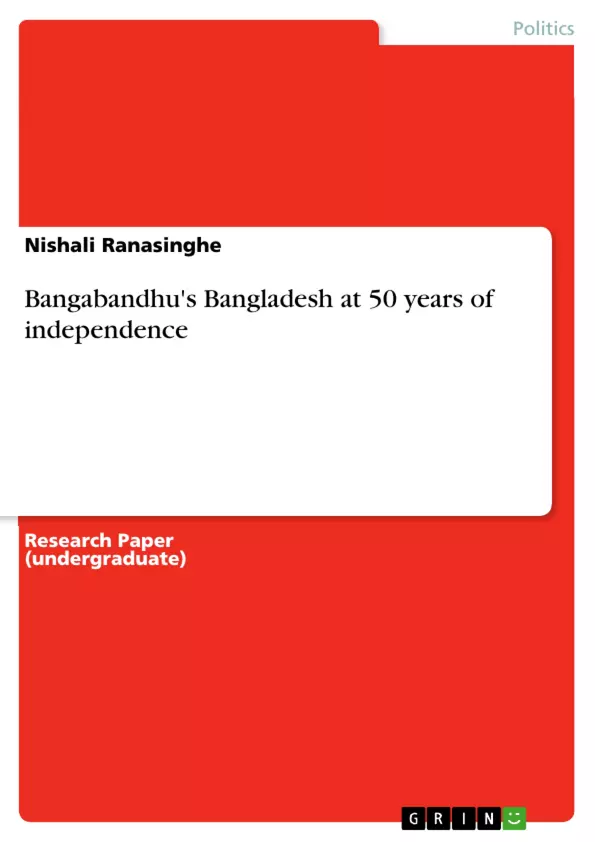As Bangladesh is celebrating its 50th year of independence, this paper will try to look back at the obstacles and achievements of the country. The discussion will carry on by examining the fundamental principles laid down by the founding father of Bangladesh, Sheikh Mujibur Rahman, famously known as "Bangabandhu", the friend of Bengal, who became the driving force for the country's development. Next, the paper will look into the present status of Bangladesh will identify how the principles and policies laid by its ancestors help them to achieve its success.
Inhaltsverzeichnis (Table of Contents)
- 1. Introduction
- 2. Discussion
- The principles and policies of Bangabandhu: The Base of Bangladesh
- Bangladesh at 50: The lessons we take from obstacles
Zielsetzung und Themenschwerpunkte (Objectives and Key Themes)
This paper aims to analyze the development of Bangladesh over its 50 years of independence, focusing on the foundational principles laid by Sheikh Mujibur Rahman ("Bangabandhu") and examining how these principles have contributed to the nation's progress despite numerous challenges.
- The foundational principles and policies of Bangabandhu Sheikh Mujibur Rahman.
- The socio-economic and political development of Bangladesh post-independence.
- Bangladesh's approach to international relations and its non-aligned foreign policy.
- The impact of challenges like natural disasters and political instability on Bangladesh's development.
- Lessons learned from Bangladesh's journey for other developing nations.
Zusammenfassung der Kapitel (Chapter Summaries)
1. Introduction: This introductory chapter sets the stage by highlighting Bangladesh's remarkable rise from a war-torn nation to a developing country celebrating 50 years of independence. It emphasizes the country's journey as an uphill battle against numerous obstacles, including natural disasters, poverty, and infrastructural weaknesses. The chapter establishes the importance of understanding the foundational principles laid after independence as a driving force behind Bangladesh's progress and promises to explore these building blocks in detail.
2. Discussion: The principles and policies of Bangabandhu: The Base of Bangladesh: This section delves into the foundational principles and policies established by Sheikh Mujibur Rahman, the founding father of Bangladesh. It emphasizes his focus on human development, prioritizing the needs of the people, particularly after the war. Bangabandhu's vision encompassed social and economic advancement, building on a secular, multi-cultural foundation that fostered peaceful coexistence. The chapter details his commitment to good governance, combating corruption, and upholding human rights, all while advocating for a "culture of peace" in both domestic and international affairs. His non-aligned foreign policy, characterized by "friendship with all, malice to none," is presented as a strategic approach to navigate the complexities of international relations.
2. Discussion: Bangladesh at 50: The lessons we take from obstacles: This section briefly discusses Bangladesh’s continued success despite facing various challenges during its five decades of independence. It alludes to the nation's resilience in overcoming a war, military dictatorship, the Rohingya crisis, natural disasters, and a pandemic while achieving progress across various sectors. This chapter sets the stage for further exploration of the successes and enduring lessons learned from overcoming adversity, although the specific details are not provided in the given text excerpt.
Schlüsselwörter (Keywords)
Bangladesh, Sheikh Mujibur Rahman (Bangabandhu), independence, development, human development, peaceful coexistence, culture of peace, good governance, human rights, non-aligned foreign policy, sustainability, obstacles, challenges, resilience.
Frequently Asked Questions: A Comprehensive Language Preview of Bangladesh's 50 Years of Independence
What is the purpose of this document?
This document provides a comprehensive preview of a longer work analyzing the development of Bangladesh over its 50 years of independence. It includes the table of contents, objectives and key themes, chapter summaries, and keywords.
What are the main topics covered in this preview?
The preview covers the foundational principles and policies of Bangabandhu Sheikh Mujibur Rahman, the socio-economic and political development of Bangladesh post-independence, Bangladesh's foreign policy, the impact of challenges on its development, and lessons learned for other developing nations.
What are the key themes explored in the document?
Key themes include Bangabandhu's foundational principles (human development, peaceful coexistence, good governance, human rights), Bangladesh's socio-economic and political progress despite obstacles (natural disasters, political instability), Bangladesh's non-aligned foreign policy, and the nation's resilience.
What is the focus of the "Introduction" chapter?
The introduction highlights Bangladesh's remarkable journey from a war-torn nation to a developing country, emphasizing the challenges overcome and the importance of understanding the foundational principles that drove its progress.
What does the chapter on "The principles and policies of Bangabandhu: The Base of Bangladesh" discuss?
This chapter delves into the foundational principles and policies of Sheikh Mujibur Rahman, focusing on his vision for human development, social and economic advancement, good governance, human rights, and his non-aligned foreign policy.
What is covered in the chapter "Bangladesh at 50: The lessons we take from obstacles"?
This chapter briefly discusses Bangladesh's continued success despite facing various challenges such as war, military dictatorship, the Rohingya crisis, natural disasters, and a pandemic. It highlights the nation's resilience and sets the stage for a more in-depth exploration of lessons learned from overcoming adversity.
What are the key words associated with this document?
Keywords include Bangladesh, Sheikh Mujibur Rahman (Bangabandhu), independence, development, human development, peaceful coexistence, culture of peace, good governance, human rights, non-aligned foreign policy, sustainability, obstacles, challenges, and resilience.
What is the overall aim of the research presented in this preview?
The research aims to analyze Bangladesh's development over 50 years of independence, focusing on Bangabandhu's foundational principles and how these principles have contributed to the nation's progress despite numerous challenges.
- Citation du texte
- Nishali Ranasinghe (Auteur), 2022, Bangabandhu's Bangladesh at 50 years of independence, Munich, GRIN Verlag, https://www.grin.com/document/1239570



